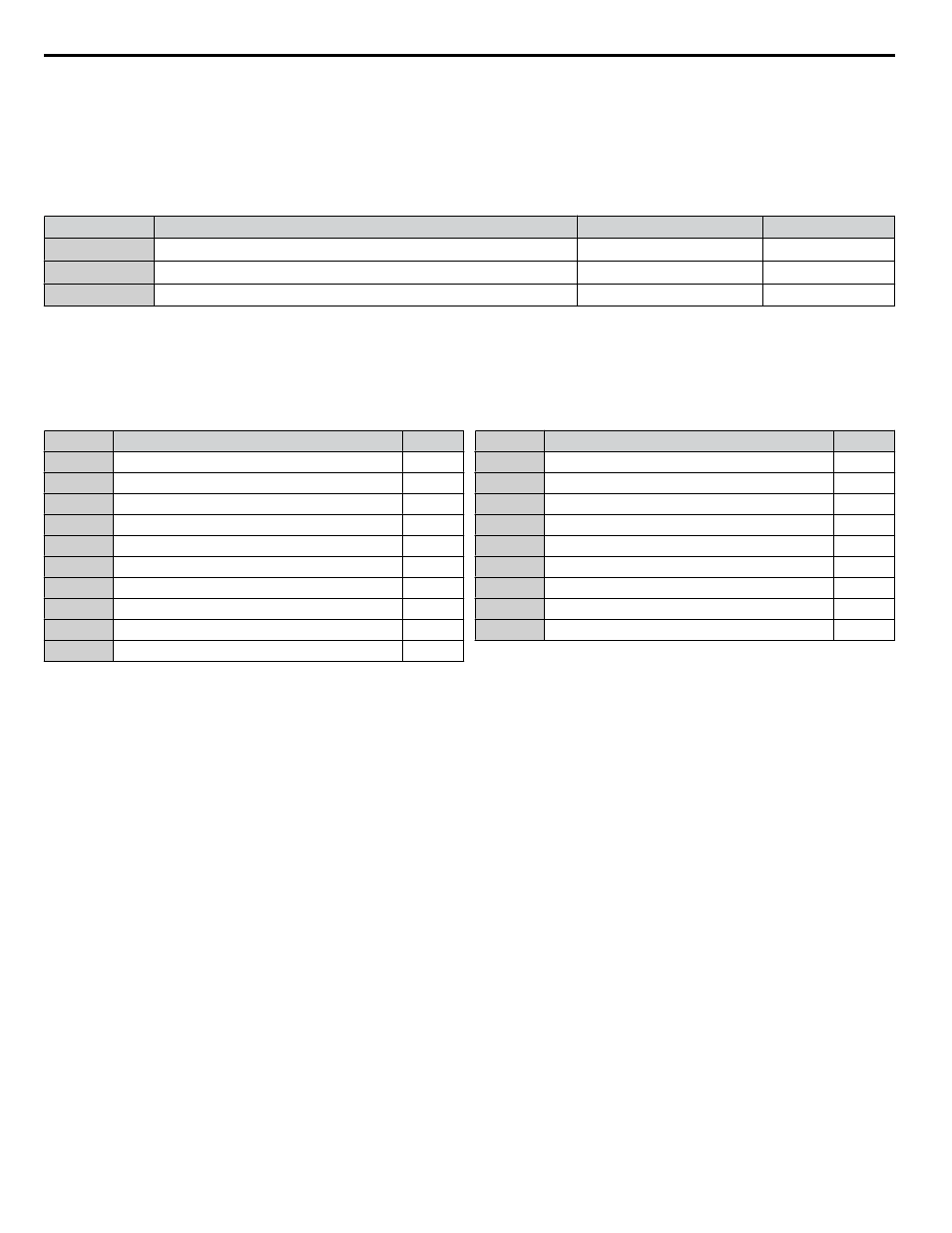For a list of functions and descriptions – Yaskawa Z1000U HVAC Matrix Bypass User Manual
Page 178

Setting 6: A2 and A3 Only Enabled
Setting 7: All Analog Input Terminals Enabled
n
H3-16 to H3-18: Terminal A1/A2/A3 Offset
Set the offset level of the selected input value to terminals A1, A2, or A3 that is equal to 0 Vdc input. These parameters rarely
require adjustment.
No.
Name
Setting Range
Default
H3-16
Terminal A1 Offset
-500 to 500
0
H3-17
Terminal A2 Offset
-500 to 500
0
H3-18
Terminal A3 Offset
-500 to 500
0
n
Multi-Function Analog Input Terminal Settings
for information on how H3-02 and H3-10 determine functions for terminals A1, A2, and A3.
Note:
The scaling of all input functions depends on the gain and bias settings for the analog inputs. Set these to appropriate values when selecting
and adjusting analog input functions.
Table 5.23 Multi-Function Analog Input Terminal Settings
Setting
Function
Page
0
Frequency Bias
1
Frequency Gain
2
Auxiliary Frequency Reference 1
3
Auxiliary Frequency Reference 2
4
Output Voltage Bias
5
Accel/Decel Time Gain
6
DC Injection Braking Current
7
Overtorque/Undertorque Detection Level
8
Stall Prevention Level During Run
9
Output Frequency Lower Limit Level
Setting
Function
Page
B
PID Feedback
C
PID Setpoint
D
Frequency Bias
E
Motor Temperature (PTC Input)
F
Through Mode
16
Differential PID Feedback
1F
HAND Reference
25
Secondary PI Setpoint
26
Secondary PI Feedback
Setting 0: Frequency Bias
The input value of an analog input set to this function will be added to the analog frequency reference value. When the frequency
reference is supplied by a different source other than the analog inputs, this function will have no effect. Use this setting also
when only one of the analog inputs is used to supply the frequency reference.
By default, analog inputs A1 and A2 are set for this function. Simultaneously using A1 and A2 increases the frequency reference
by the total of all inputs.
Example: If the analog frequency reference from analog input terminal A1 is 50% and a bias of 20% is applied by analog input
terminal A2, the resulting frequency reference will be 70% of the maximum output frequency.
Setting 1: Frequency Gain
The input value of an analog input set to this function will be multiplied with the analog frequency reference value.
Example: If the analog frequency reference from analog input terminal A1 is 80% and a gain of 50% is applied from analog
input terminal A2, the resulting frequency reference will be 40% of the maximum output frequency.
Setting 2: Auxiliary Reference 1
Sets the auxiliary frequency reference 1 when multi-step speed operation is selected.
Refer to Multi-Step Speed Selection on
Setting 3: Auxiliary Reference 2
Sets the auxiliary frequency reference 2 when multi-step speed operation is selected.
Refer to Multi-Step Speed Selection on
Setting 4: Output Voltage Bias
Voltage bias boosts the output voltage of the V/f curve as a percentage of the maximum output voltage (E1-05). Available
only when using V/f Control.
5.7 H: Terminal Functions
178
YASKAWA SIEP YAIZ1D 01A Z1000U HVAC MATRIX Drive Bypass Technical Manual